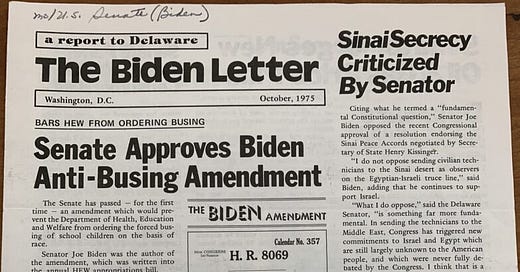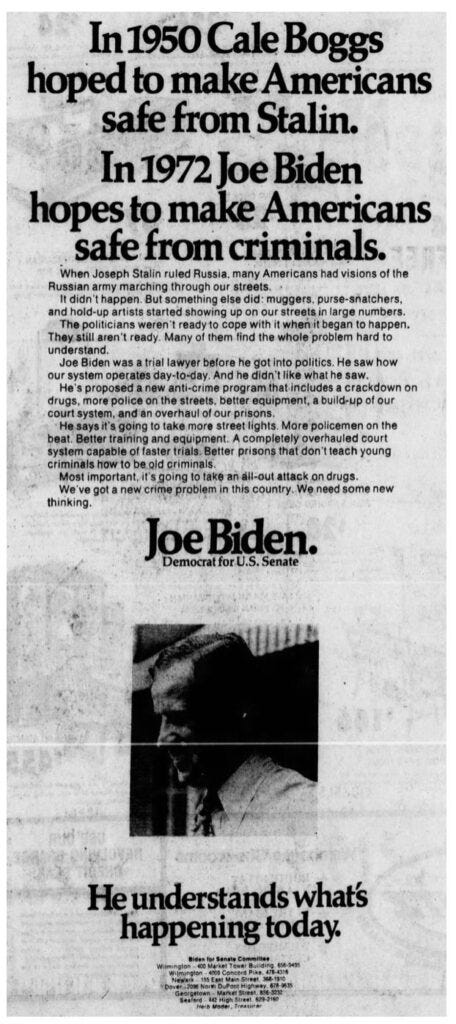Joe Biden Is A Centrist
Joe Biden is a centrist, and that he's not more of an education reformer is less about him than the political environment reformers backed into
Centrism is one of those words that is in common usage but has an awful lot of definitions. It can mean practical, or politically moderate, someone whose views sort of wash out as centrist because they're left on some things and right on others. That's more common than it seems. Or, it can be someone who just splits the difference so their politics derive from wherever the poles happen to be at a point in time.
President Biden isn't a centrist like these definitions in an inter-party sense, but he is an intra-party one. Biden's a longtime politician whose centrism can be largely traced back to Democratic party orthodoxy. Find the rough center of the Democratic party at any point in time, and right around there you'll usually find Joe Biden.
Before I explain that more I want to note clearly that I don't think that's inherently a bad thing. Pragmatism and dealmaking are underrated in politics right now. Biden spent decades in the United Senate and whether you agree or disagree with him that's service worthy of respect as is his current role. (And as I've noted before in the interest of transparency I voted and raised money for him in 2020 even though you could tell his education policy was going to leave a little to be desired.) He's a good politician.
Here's what I mean. President Biden now tells a story of how he got into politics to fight for civil rights. But as his own Vice President noted during the 2020 campaign, he was a noted opponent of busing. Why? Well, a lot of Democrats at the time were. Because a lot of people were.
Almost two decades later here's Biden going after President George HW Bush for not being tough enough on drugs.
Back in the day Biden was pretty law and order, too:
Coming back to education, in 1997, in the midst of an elite pressure campaign about school choice Biden became voucher-curious on the Senate floor, noting that he was reconsidering his opposition to private school choice (and its constitutionality, which the Supreme Court later upheld).
My point is not the right or wrongness of any of these positions, and it's fine for politicians, like the rest of us, to change their minds as evidence or situations change. Rather, my point is that none of these positions made Biden that unusual. Even on the voucher vote, Biden voted no, but support for school choice was already growing among Democrats at the time. All of these positions were places you'd find a roughly median Democrat at the time. Again, Biden is a politician.
'Biden has just moved left' some people will say, or something to that effect in stronger terms. And that's true, and you what else? The Democratic party has moved left, especially the past few years (and the GOP has moved right obviously). In his party Biden is just keeping up with the times. In other words, like most politicians, Biden is more likely to jump in front of a parade than organize one and is a largely a creature of political circumstance. Surprise! He is a politician.
What does any of this have to do with education now?
One school of thought, popular among some reform types, is that if only Biden had some ganas on the issue things would be different. I think that's a stretch given how dysfunctional Washington is. Perhaps if Biden had made education reform rather than infrastructure a core issue he could have moved some actual reform legislation but Presidents only get a few bites at the apple and Biden's choices his first year in office made political sense for him. Education reform remains a party splitter for Democrats, it's a big part of why Republicans are making inroads on the issue.
Instead, imagine a world where there was real pressure for education reform and politicians were vying to outdo each other on the issue or at least responding to that political pressure. You don't have to look too far, that's the dynamic among Republicans showing up to debate right now. Former South Carolina Governor Nikki Haley and current Florida Governor Ron DeSantis recently tangled over who was better on the issue. It happened in 2000 in the Bush - Gore race. It happens in state races. It happened with Obama in 2008. And then didn't happen after circumstances changed post-2012.
When Bill Clinton was championing charter schools a lot of Democrats reluctantly signed on. That changed post-Clinton. When he was whip in the House of Representatives Tom DeLay famously noted publicly that No Child Left Behind offended his sensibilities but he pushed it forward anyway because the President of his party (George W. Bush) had made it a priority.
So this is all to say context and conditions matter and politicians react to the political environment. But the political environment doesn't happen by accident. It takes interest groups, activists, and dollars supporting them to fuel all that. You might have noticed those are things somewhat missing from the ed reform world - especially since everyone got the sads after Donald Trump was elected.* Those elements are not missing from the part of our sector that doesn't want broad structural reform.
So the reform world might want to ask itself, if Joe Biden isn't much on education reform, why is that? And what could be done differently to change the national education conversation? How could you make - against the wishes of some folks on both sides - education a little less partisan? If we supported more parent activism? Why was the education conversation so different in the '07-'12 period than it is now? What might happen if people really leaned into the context and conditions - especially now with the issue so up for grabs? It's probably too late for Biden's first term but it's not too late. These are questions worth discussing.
Remember, the backdrop here is a sector that can't say enough about its commitment to equity. Where majorities of people, especially Black and Hispanic people, support ideas like charters and choice. And where there is generalized - though politically disorganized - support for making the system more accountable and responsive.
I can hear a certain kind of person in our sector, right-leaning but not exclusively so, saying, 'hey, he's President of the United States for God's sake, Joe Biden has plenty of power to do what he wants.'** This is an extension of the "great person," (which used to be called "great man," in a more sexist time) theory of change. We just need political heroes that argument goes, who are willing to stand up against the pressure and do the right thing. At one time that was senators like Cory Booker, or Mary Landreiu. But in practice politicians have a lot of concerns, their own reelection at the very top of the list with everything else a distant second. Heroes come and go or their political priorities change. That remains bipartisan. Sure pols sometimes do difficult and impressive things, Lyndon Johnson on civil rights, Mitt Romney on impeachment, or Marjorie Margolies on the 1993 budget. There are other examples, but it's kind of rare. The median politician is by definition median. And that's where context and conditions matter to political behavior. That's where you aim.
This also applies more generally. If you're always looking for bravery you'll end up mostly disappointed, it's not just politicians who are going to put their own careers first. I'd like to see some ideas about how to support risk takers more. But we're not going to alter some basic facts of life. Mark Twain, for example, noted that it was strange physical bravery was so common and moral bravery so rare.
Bottom line: Make education reform safer for the average bear and you'll see Joe Biden (and a lot of other people) doing education reform. Because Joe Biden is an average bear. And that's actually pretty normal and what we ought to engineer around if structural change in education is the goal.
The resources exist to do that, they're just not aggressively deployed that way anymore.
*I don't mean to minimize the awfulness of Trump, but if your political commitments were this easily scrambled around say charter schools, choice, or larger issues like free speech and due process then they were not serious commitments to begin with.
**In fairness to Biden he's using political capital to push back on some Democratic liabilities around cultural issues, and ironically crime, so he can realistically only do so much.







